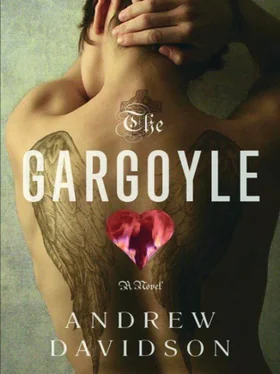To say that Marianne Engel “carved” is not enough: it was so much more than that. She caressed the stone until the stone could no longer stand it and gave up the grotesque inside. She coaxed the gargoyles out of their stony caverns. She loved them out of the stone.
Over the many hours that she didn’t notice me, I became amazed by her stamina. She was still working when I went to sleep, and continued through the night. She went all the next day as well, and into the night again. In total, she labored for over seventy hours, drinking gallons of coffee, smoking hundreds of cigarettes. This was just how she had claimed to work-carving nonstop for days at a time-but I’d never quite believed her. I assumed it was a boastful exaggeration of her artistic discipline. But it wasn’t. Skeptics might think that she waited for me to go to sleep before she herself took a nap, but her hammering kept waking me up. On the first morning, she did haul herself away from her work long enough to clean me, but I could see-could feel-that it was done grudgingly. There was an anxiousness in her eyes, a barely contained frenzy, as she raced the sponge over my skin.
Around the sixty-hour mark, she asked me to order two large vegetarian pizzas. Normally, she had no objection to eating meat, but I soon learned that when she was in her carving like this, she manically refused to do so. “No meat! No animals!” When I brought down the pizzas, she went to three corners of the room to ask her Three Masters for permission- “Jube, Domine benedicere” -and did not eat until they gave their consent. She sat haltingly unstill in the middle of the stone fragments and ate like a beast, barely seeming to notice that I was there. A cheese strand dangled from her mouth to the edge of her left nipple, and I wanted to rappel it like a mozzarella commando to storm her lovely breasts. The candlelight captured the chalky sheen of her body, and lines of sweat created tributaries through the stone dust that coated her angel wings. The combination of her tattoos and her ecstatic bearing made her seem part Hildegard von Bingen, part yakuza.
Over the hours, her stereo passed through the works of Carl Orff; Berlioz’s Symphonie Fantastique ; Beethoven’s nine symphonies; Poe (the singer, not the writer); the first album by Milla Jovovich; the entire catalogue of The Doors; the recordings of Robert Johnson; Cheap Thrills, by Big Brother and the Holding Company (four times in a row); and a variety of Bessie Smith, Howlin’ Wolf, and Son House. As the hours progressed, the music grew ever louder and her choice of singing voices more guttural. Even with my bad ears, by the end I had to retreat with earplugs to my belfry.
When she finished, she could barely stand. The completed monster was a human head with horns, atop a kneeling dragon’s body, and she kissed its stony lips before crawling up the stairs to collapse into her bed, still covered in dust and sweat.
· · ·
“Well, obviously manic depression is common among artists,” Gregor said across the table, as he poured a shot of the bourbon that he had brought for us to drink. The sun was going down and we were sitting on the back porch; Marianne Engel was still sleeping off her efforts. After reaffirming that he could not address any specifics of her previous treatments, Gregor said that he’d be happy to answer general questions.
“After reading all those books,” I said, “I decided that her symptoms were more consistent with schizophrenia than with manic depression.”
“Well, maybe. Could be both,” Gregor answered, “or neither. I don’t know. Maybe it’s obsessive-compulsive disorder. Did she ever say why she has to do so much carving all at one time?”
“She thinks she’s following instructions from God. She thinks she’s giving out the extra hearts she has in her chest.”
“Well, that’s weird.” Gregor took a sip. “Hey, this stuff is good. It beats me what’s wrong with Marianne.”
“Aren’t you supposed to know about these things?”
Gregor shrugged. “What I don’t know could fill a warehouse. Is she taking her medicine?”
“No. She hates pills even more than she hates doctors. No offense.”
I asked if she could be forced, by some sort of legal order, to take her meds. Gregor explained that only a guardian could take that step. I suggested Jack, who I had recently learned was Marianne Engel’s conservator as well as her manager, but Gregor explained that a conservator only has jurisdiction over a patient’s property, not her personal decisions. No one can force a patient into a hospital except a judge, Gregor said, and then only for a few days. I interjected that I didn’t want Marianne Engel committed; I simply wanted her to take her drugs. Gregor said that all I could do was ask nicely. Then he asked me if we could stop talking about her condition; while he felt he hadn’t gone over any line of doctor-patient confidentiality yet, he was worried he was getting dangerously close.
We left the topic at that. I asked him about Sayuri and he told me that they were seeing more of each other. Had a date that night, actually. Then he chastised me for always wanting to talk about his love life, while never giving up any details of my own. I laughed it off- What love life? -but he threw it right back at me. “You’re not fooling anyone.”
There was a pause in the conversation, but it was a good pause. Gregor took another sip of bourbon and we looked out into the sunset together. “Nice night,” he said.
“She touched me,” I blurted.
This caught Gregor off his guard. “What do you mean?”
“The first time she bathed me and saw…my groin”-Gregor knew, through his position at the hospital, about my amputation-“she inspected it. Ran her fingers over the scars.”
“What did she say?”
“That the condition of my body is not relevant to her.”
“Did you believe her?” he asked.
“I don’t know.” I swirled the bourbon in my glass. “Of course it matters. It’s gone.”
Gregor frowned. “I’m disappointed.”
Now he had caught me off guard. “By what?”
“Your answer,” he replied. “Because I believe her, and I think you should, too.”
Another pause in the conversation, which this time I broke. “It is a nice night, isn’t it?”
He nodded. I didn’t mention that the brand of bourbon Gregor had bought was the same that had spilled into my lap, costing me the penis in question. Gregor’s intentions in bringing the gift were good, so what profit was there in trying to make him feel bad about it?
I expected that the bourbon would taste like bad memories; instead, it just tasted like good alcohol. And it was nice to have: Marianne Engel quaintly clung to the idea that morphine and booze were a bad mix, but I suspect Gregor was trying to show me his wild side by allowing me a glass or two.
· · ·
A few days later, after she had recovered, I asked Marianne Engel why she increased the music’s volume throughout her carving. She reminded me that the gargoyles became louder the longer the process went on, and turning up the stereo was a way to drown out their screams. She explained that when she cut through the excess stone to find the grotesque’s form, the only way to know whether she’d reached the monster’s outline was to actually cut into it. If the grotesque screamed in pain, then Marianne Engel knew that she’d cut deep enough.
I asked whether she wasn’t afraid that she was drowning out important instructions from God. She laughed and assured me that in the entire world, there was not music loud enough to drown out the sounds of His commands.
· · ·
A major complaint of burn survivors is that only one pressure suit is covered by insurance, despite the fact that these garments cost thousands of dollars and must be worn up to twenty-three hours every single day. During the other hour, the patient is being cleaned, and if the caregiver is already busy washing the patient, how can she or he also be cleaning the pressure suit at the same time? This is why it’s essential to have at least two. “But the cost!” cry the insurance companies as they deny the claim. Furthermore, even with proper care pressure garments last only about three months.
Читать дальше











